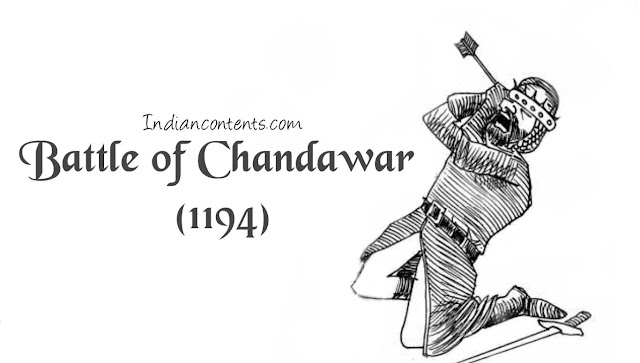The Battle of Chandwar (1194) was fought between Mu'izz
al-Din Mohammad Ghori Sultan of the Ghurid Empire and Jaya Chandra (Jaichand)
of Kannauj (Raja of Banaras) of the Gahadavala dynasty. It took place at Chandwar (modern
Firozabad), on the banks of Jamuna River close to Agra.
Backgound:
Muhammad Ghori was determined to establish his authority
over India. In 1191, he proceeded towards Indian Sub-continent through the
Khyber Pass and stormed the strategic fortress of Tabarhindah (either Bhatinda
or Sirhind), which was situated within the dominion of Prithviraj Chauhan and
laid siege to the city, which was the main reason behind the first battle of
Tarain in 1191. Muhammad Ghori was
defeated in the hands of Prithviraj Chauhan in this battle. Mohammad Ghori was
not disheartened over his defeat. He increased his strength and army power and
made preparations to avenge his defeat. He then reappeared in 1192 A.D at
Tarain and fought again with Prithvi Raj Chauhan in Second Battle of Tarain. Muhammad
Ghori became victorious in this battle and captured Ajmer.
It is said that, due to the conflicts between Jaya Chandra and
Prithvi Raj, Jaya Chandra helped Muhammad Ghori against Prithvi Raj Chauhan.
Following the victory Muhammad Ghori went back to Ghazni,
leaving Qutb-ud-Din Aibak in-charge of his Indian possessions. In a short time,
Qutb-ud-Din conquered Meerut, Kol and Delhi and made Delhi the seat of his
government.
According to Hasan Nizami's 13th century text Taj-ul-Maasir,
Muhammad Ghori decided to attack the Gahadavala kingdom after taking control of
Ajmer, Delhi and Kol. He dispatched a 50,000-strong army commanded by Qutb
al-Din Aibak. This army defeated "the army of the enemies of the
Religion". It appears that the defeated army was not Jayachandra's main
army, but only a smaller body of his frontier guards.
Then it became clear to Jaya Chandra that Muhammad saw
himself as a conqueror and not a raider and prepared to fight with Muhammad
Ghori. When Ghori came to know the preparations of Jaya Chandra to fight, he came
back to India. Then the Muslim army advanced to Kanauj. Muhammad then sent Qutb
al-Din Aibak to attack Jaya Chandra and Jayachandra then himself led a larger
army against Qutb al-Din Aibak in 1194 CE.
According to the contemporary Muslim accounts, Jayachandra
was "the greatest king of India and possessed the largest territory".
These accounts describe him as the Raja of Banaras (king of Varanasi). According
to Kamil ut-Tawarikh, his army had a million soldiers and 700 elephants.
The Hindu accounts (such as Vidyapati's Purusha-Pariksha and
Prithviraj Raso) claim that Jayachandra defeated the Ghurids multiple times.
The contemporary Muslim accounts, on the other hand, mention only two battles:
one relatively minor engagement and the Battle of Chandwar, in which
Jayachandra was killed.
Battle:
The battle was fought at Chandwar (modern Firozabad), on the
banks of Jamuna River close to Agra. According to the 16th century historian
Firishta, Jaya Chandra’s army was step ahead in the battle, in most accounts
the Gahadavalas were close to victory. But suddenly an arrow from Qutb al-Din
hit Jaya Chandra in the eye, killing him. He fell off his elephant, and was trampled.
He could only be identified by the gold
caps on his teeth after the battle. With the death of their leader the
Gahadavala army broke and fled, taking heavy casualties during the pursuit. finally muslim army won the battle.
An alternative tradition says Jaya Chandra escaped from the
battlefield and found a new dynasty in the Kurnaon Hills but there is no historical
evidence
After the battle:
The Ghurids captured 300 elephants alive, and plundered the
Gahadavala treasury and took possession of the Asni fort. After this, the
Ghurids advanced to Varanasi, a famous Hindu pilgrim center. He plundered all
the temples and enslaved the Hindus. According to Hasan Nizami, "nearly
1000 temples were destroyed and converted into mosques". A number of local
feudatory chiefs came forward to offer their allegiance to the Ghurids.
Jayachandra's son Harishchandra succeeded him on the
Gahadavala throne. According to one theory, he was a Ghurid vassal till Harishchandra,
recovered Kanauj, Jaunpur and Mirzapur in 1197. And Rajput resistance continued in Kanauj and
stayed independent until Iltumish conquered it.






1 Comments
Wonderful work. Well collected information
ReplyDelete